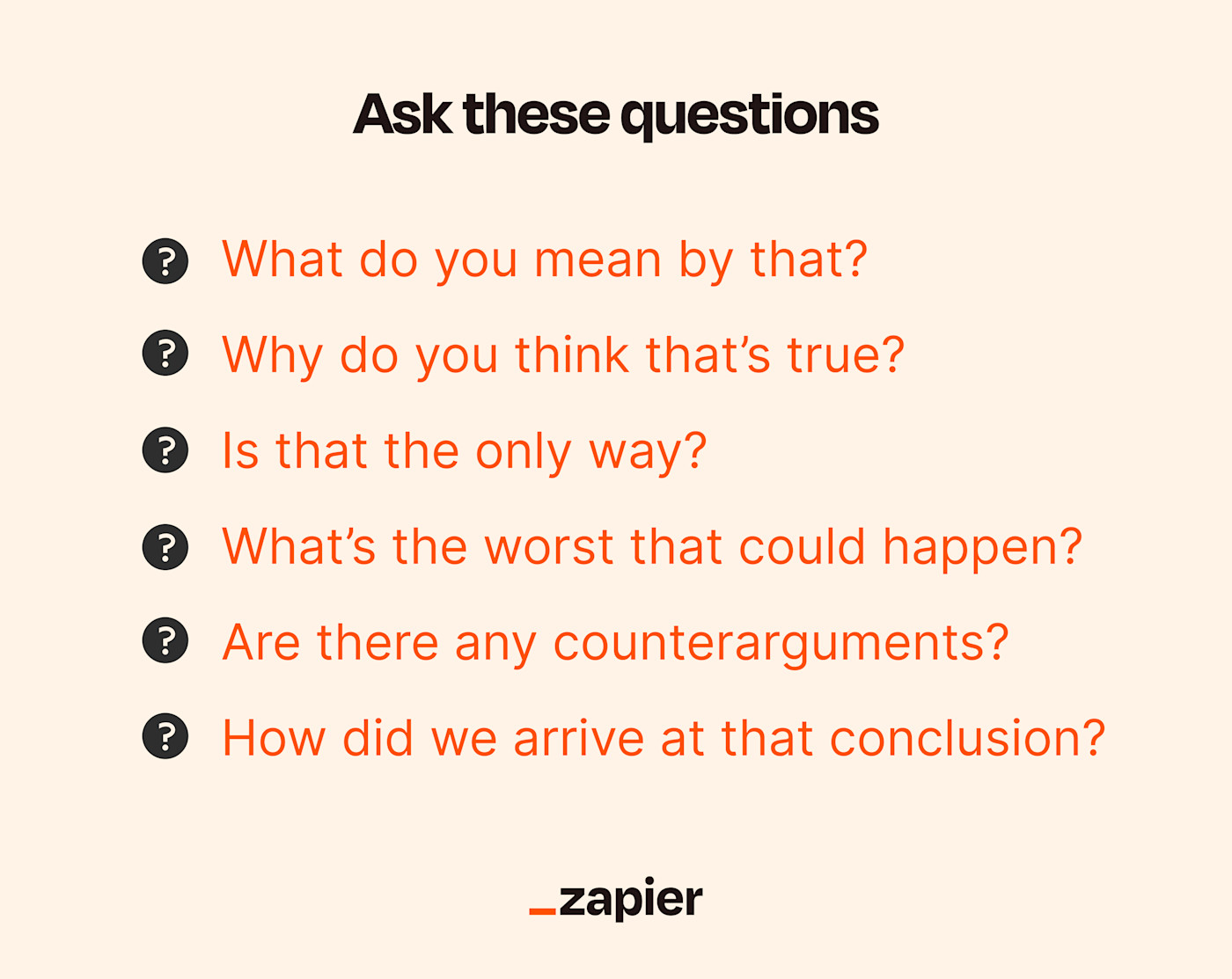When I was a first-time founder, my approach to business was akin to playing a game of chance: pulling various levers and praying for a lucrative outcome. As you might expect, this haphazard strategy only led to a series of setbacks, including everything from cash flow issues to unmet objectives to dissatisfied customers.
One of the things that got me on track was a book called The Road Less Stupid, by Keith Cunningham, which introduced me to the concept of Socratic thinking.
What is Socratic questioning—and why should businesses care?
Socratic questioning (also called the Socratic method, Socratic thinking, Socratic teaching, the Socratic technique, and literally every other possible iteration of the term) is a concept named after the philosopher Socrates, who used questioning as a tool to stimulate critical thinking and uncover hidden truths.
It's basically about asking open-ended questions.
Ok, it's more nuanced than that (it's a millennia-old philosophy, after all), but for our purposes, that's what you want to focus on. The idea is that by asking open-ended questions, we can clarify concepts, challenge assumptions, and explore different perspectives.
The Socratic method is usually associated with teaching and therapy, but it's also particularly helpful when applied in business—because assumptions, weak concepts, and fixed mindsets can be an entrepreneur's downfall.
After I started using Socratic questioning—that is, after I started asking a lot of open-ended, broad-reaching questions—I noticed a huge improvement in all aspects of my work. One of the most notable differences was alignment with my co-founder. Together, we would challenge our assumptions and clarify our ideas until we had a rock-solid understanding of something.
Our dialogue would frequently include questions like these:
What do you mean by that?
Why do you think that's true?
What are other ways we could approach this problem?
What's the worst thing that could happen if we tried this project?
Are there any strong counterarguments to this?
Can you help me understand how you came to that conclusion?
If we stopped doing this, what material impact would it have on our business?
These questions might seem obvious at first, but as an excited entrepreneur that has a hint of success, it's easy to lose discipline and fall victim to faulty concepts and weak assumptions. So we made this approach a priority in our business.
How to apply the Socratic method for better results

Before you start channeling your inner Socrates, there's a prerequisite: adopt a growth mindset and drop the ego. You'll need to challenge others, and you'll be challenged in return. This can be uncomfortable, but it's necessary for this kind of questioning to work.
If you're ready, here are a few ways you can start using Socratic questioning in your work.
Getting stakeholder buy-in
Getting buy-in from stubborn stakeholders is no one's idea of fun. Provided you've been diligent with your project, you can start to include Socratic dialogue with stakeholders who push back on your ideas without having fully considered them.
Here are some questions you could ask:
What are your thoughts on the current situation or problem we're trying to solve with this project?
What do you think could be the potential drawbacks of implementing this project? Do you think we've accounted for them appropriately?
How do you think this project could be implemented in a way that aligns with your values and mission? What about the company's?
In your eyes, what would be the key success factors for this project, and how can we measure progress toward those goals?
What would need to happen in order for you to be aligned with this project?
What do you think the consequences of not proceeding with this project are?
The particular questions you might ask will be dependent on the project and scenario, of course, but the goal is to get the stakeholders to speak their minds (beyond a "no"), so they can help you understand their position—and hopefully rethink their own.
Understanding and empathizing with team members
I often find myself making assumptions without validating them. (Translation: I'm human.) The Socratic method encourages reflection and critical thinking to help avoid this pitfall. This works for all sorts of scenarios, especially when it comes to workplace interactions.
Let's say you're dealing with an underperforming employee. You might assume they're not putting in their full effort—or worse, they're not a good fit for the job—but what if they're just not equipped with everything they need to be successful in their role?
Rather than running with the narrative you've made up in your brain, Socratic dialogue can help you (and the employee) understand why this person is performing the way they are. Here are some questions you might ask to help navigate the situation:
Can you help me understand your perspective on your current performance?
What do you believe are the factors contributing to your performance level?
Which aspects of your work do you find most challenging, and why?
If there was one thing you could ask of me, what would it be, and why?
This method isn't just for resolving problems, though. It's also a fantastic way to stimulate creativity to achieve big goals. For example, a team could benefit from answering similar questions framed toward their current goals and progress:
What do you think are the key factors that have contributed to our successes so far?
What opportunities do you see for our team to make a greater impact or achieve more in our domain?
Can you identify any barriers or limitations that might be preventing us from setting more audacious goals?
How can we ensure that our team remains motivated, engaged, and committed to achieving these challenging objectives?
Interviewing your customers
There's nothing worse than running customer interviews with leading questions or taking everything you hear at face value. So in my opinion, this is where the Socratic method shines most.
Here are some customer interview questions I've found to work best:
What brought you to use [Company]? Tell me more.
What are some other services you used or considered besides [Company]?
What were you hoping to achieve through using [service or product type], and why?
Did you achieve that? How come?
What features or services would you love to see from [Company]? Why?
Do you understand how the pricing works? Tell me more.
What do you think is an acceptable price for the service?
What do you think is super expensive?
What do you think is a bargain?
Would you recommend [Company] to a friend? Why or why not?
Any questions for us? What made you ask that?
If you're worried about customers giving you "bad" information (they won't), this kind of questioning can help ensure they've challenged their own assumptions—and their answers will help you challenge yours.
Where do we go from here?
How's that for an open-ended question?
People love to toss Socrates' teachings around (he can't put up a fight, after all), but what this really comes down to is asking questions. The goal isn't to get specific answers: it's to get a variety of perspectives, challenge assumptions, and gain clarity. And then, of course, to personalize it: how will you use the fruits of that dialogue to grow your business?
Related reading:





